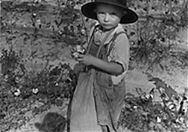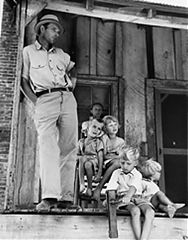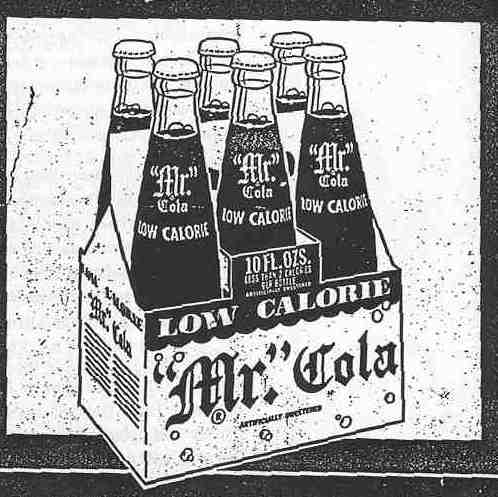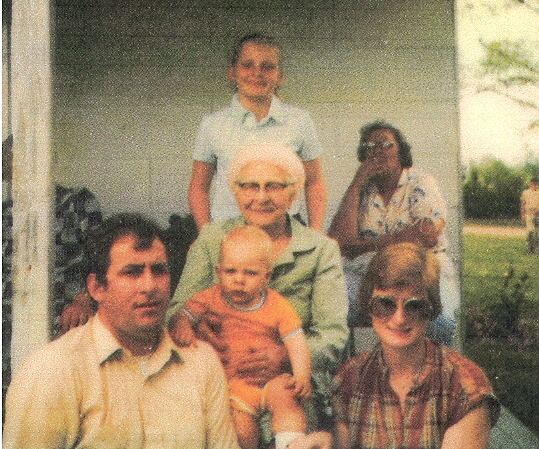TRANSCRIPTION
Besides the military, what other occupations did you have?
I worked in the fields when I was a kid, at a service station, in factories and ran a few of them after I got out of school, and worked in the lumber business mostly.
What did you do in the field?
I picked cotton and hoed cotton.
Did you have any other jobs at the time?
No, except for the other jobs around the house, like cutting wood, fixing fences and seeing about the cows and the horses, stuff like that.
How old were you when you first started picking cotton?
I was six years old.

How old were the other people around you, were you the youngest?
I probably was one of the youngest.
Now you were saying that you guys worked the fields and picked cotton and that was because your families were sharecroppers, is that correct?
That is right.

Growing up on a farm, did you have to tend to any animals?
Yeah, we had to milk cows and put the milk into cans, and then we had to put the milk into a barrel and fill it with water to keep the milk cool. We had to pump the water by hand and it took about 30 gallons.
When you look back in history it says the a lot of the share croppers were primarily black in that time frame especially in Mississippi in that time frame that you worked in and I know that you said that you picked cotton from 1955 to 1964. Did you work with black people that had that occupation at that time?
I worked with some of them.
What was it like working with the black people in those days?
I didn't have a problem with them.
Were you assigned to certain areas, was it segregated?
No, we worked side by side.
Now the question would be, did you work along aside of them or were you seen as superior or different in position?
I worked right beside them.
Were you treated differently by the people that you worked for compared to them?
Some of the owners treated me the same as them and some treated me different.
How did the black people treat you, were you seen as equals or was it a different type of working environment?
There was a little bit of indifference but not much but there was a little bit of difference.


How many hours on average did you work?
We worked from about 6 in the morning until about 5:30 or 6 in the afternoon.
Can you describe an average day?
Get up at 7 o'clock go to the field and pick cotton until about 11:30 or 12 o'clock. We would take about a 30 minute lunch break, get back in the field and work until the end of the day.
Lunch, I know you've talked about your southern lunches before, what were they like?
Onions, Bologna and biscuits or hashbrowns and we use to get belly washers or Mr. Cola is what they were but we called them belly washers

If you were in the field, when did you go to school?
We did a thing called summer school. It was split sessions were you go two months in the summer and then we would get out in August and then pick cotton until September. We would go back to school around the first of October or something like that. We would go to school during June and July. They called it summer school and fall.
What were your hobbies like when you were younger if you were picking cotton so much?
Cotton-ball Fights!
What is that?
Throwing cotton balls before the ball popped open and hitting someone on the head with them. They were green and still hard; it was like hitting somebody with a baseball. If we didn't use cotton balls we would pick up dirt clods and throw them. Sometime we play baseball but we had to make our own baseball and bat.


How much did picking cotton pay?
You would get 2 dollars for every hundred pounds that you picked.
How much cotton were you able to pick in a day?
I was able to pick about 200 to 250 lbs. a day.
Why did you stop picking cotton?
We were replaced the cotton picking machines.
I know the early machines did not work to well; did they help you in the field or hinder you or what?
They completely replaced us.


If the older sibling were in the field, would your mother stay at home with the younger children or go with you to the fields?
The younger children went to the field and stayed off to the side and just played. They had to go because well-fare was not even thought of back then.


What event of events in your life effected to who you are today?
School probably helped a lot, changed a lot of thing. Going into the army, serving in the military has changed me, it helped me get my degree by using the GI bill and that's about it except for working in factories and stuff.


If you can describe yourself in six words what would they be?
Sixty-year old, stubborn, bald-headed, obnoxious man
Is there anything else you think you might want to add about you family life or growing up?
We all worked hard in the fields and we were subject to the chemical called 24D which was used for defoliation. Out of the 11 of us there is only 4 of us left and none of us made it to the age of 60 accept for me and my brother, all the rest of them died young.

